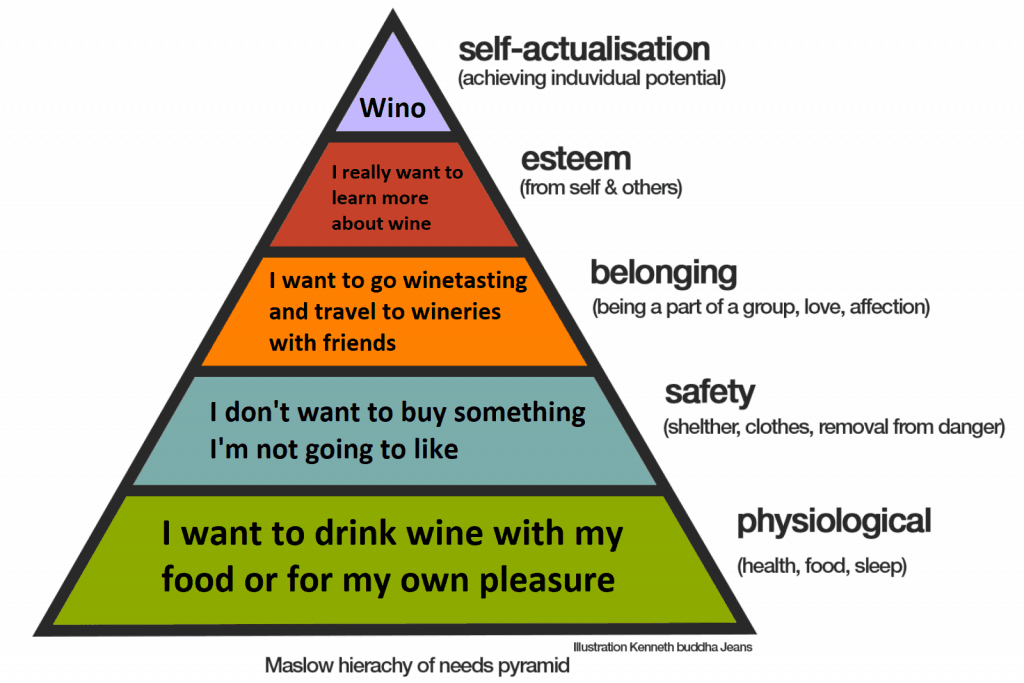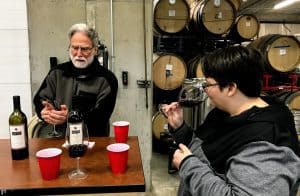While I greatly enjoy his philosophical pondering on his Edible Arts blog , I couldn’t disagree more with Dwight Furrow’s recent post decrying “Bad Advice for Novice Wine Drinkers”. The offending guidance is to drink what you like because “If you like it, it is good”.
Furrow dislikes that approach because he feels it curbs a desire to learn more about wine and expand horizons.
The slogan assumes that there is nothing beyond your merely liking something that accounts for its quality, nothing more to be discovered and nothing more to be enjoyed. Thus, if you endorse this claim you have no reason to recognize the limitations of what you like or search for something better. It is a shame to encourage such an attitude in novice wine drinkers. — Dwight Furrow, Bad Advice for Novice Wine Drinkers, 12/13/2018
Furrow errs in two regards here.
For one, there are a lot of drinkers who will never expand beyond simply drinking what they like. They will never develop a desire to want to learn more. Nor will they ever care to think about the quality of what they’re drinking. While that can be a shame, it’s only a shame to us–the Winos who want more from our wines.
We are the ones shedding the tears of shame at all the things we feel our fellow wine drinkers are missing–not the newbie that is happily content sipping on Apothic Brew.
The second area that Furrow overlooks is that of internal inertia or motivation. The novice drinkers who are destined to explore and expand their horizons will feel that inertia on their own. They don’t need “gentle coaxing”–especially not in the form of telling them that what they’re currently drinking is crap.
My outlook on this is shaped by Maslow’s hierarchy of needs which we can adapt to the motivation and growth of wine drinkers.

Original image from Bitcoin & Maslow’s Hierarchy of Needs. Drawing by Kenneth buddha Jeans with text added.
A Wine Hierarchy of Needs
Our motivations as wine drinkers are not that dissimilar from our motivations for everything else in life. There are basic needs that enjoying wine can fulfill as well as the potential for more emotional and intellectual satisfaction.
There are other benefits to viewing wine drinkers through Maslow’s pyramid. You get a sense for the breadth of each level. The Winos among us would love for everyone to get the same enjoyment with wine that we do. Yet, while we want to share our geeky connoisseurship, most people are going to plateau before that. Most wine drinkers find their needs met at other levels.
The problem comes when we try to put expectations and judgement on the motivations of people who are at these different levels. When we expect newbies who are driven by safety or physiological motivations to “know better” or at least want to know better, we’re not educating them. We’re not helping them to “master” their current level and potentially move on to the next.
If anything, we’re scaring them back to the comforts of what’s familiar and giving them little desire to want to associate with wine or “wine people”.
To really educate and appeal to wine drinkers at all levels, we need to understand where they are in their journey and what is motivating them.
Physiological – I want to drink wine with food or for my own pleasure.
This is where everyone starts–even Fred Dame, Jancis Robinson and Robert Parker. Everyone first approached wine as something to drink. We may have been introduced to it on the dinner table with family or in a red solo cup at party.

Or as god knows what mixed into a sangria.
It was an accompaniment to something–whether it be a meal or a moment–and likely we did not give much thought to what was in the glass.
For a lot of people who drink wine, they will never go beyond this level. Wine will still be “foodstuff” to have at the table like it’s been in Europe for centuries. Or it will be “booze”, something to give a warm buzz that is more flavorful than beer and doesn’t hit as hard as a cocktail.
But there will be people who begin paying attention to what is in their glass. The first serious question that they’ll ask will be “Do I like this?”
Safety – I don’t want to buy something I’m not going to like.
When a wine drinkers starts to think about what they like and don’t like in wine, they become motivated by “safety”. They don’t want to waste their time, money or pleasure drinking things that they don’t enjoy.

The best education that sommeliers and wine stewards can give newbies at this level is help with language to explain what they like or don’t like in a wine.
This is NOT the level to be “educating” them on good tastes vs bad.
These drinkers might not have the language to explain what they like but they eventually notice patterns. They might not like the “bitterness” or “sour” flavors of tannins and acid. Instead, it could be the siren songs of residual sugar and “smoothness” that beckons them.
This is the stage where newbies often get the scorned advice to “drink what they like”. But the idea is not to stunt their growth or education. The idea is to keep them enjoying wine and to not get turned off or intimidated.
If we start trashing their tastes and enjoyment, we slam the door shut on the next level of motivation before the newbie even get’s a chance to peek inside.
Belonging – I want to go wine tasting and travel to wineries with friends.

The tasting room not only gives wine drinkers a sense of social belonging, but also exposure to different wines that they may end up liking.
Wine is a social beverage. It brings people together. But it can also push people away.
If we scare newbie drinkers into doubting themselves–into thinking their tastes are bad–we send the message that they don’t belong. We give them no motivation to continue exploring.
Yet for the people that reach this stage, there is internal inertia that exposes them to other horizons. Wine drinkers that enjoy wine enough to want to share it end up meeting fellow wine lovers. They begin seeing a world beyond their own experiences. They’re introduced to other wines that people enjoy and, perhaps, find their own tastes broaden.
Most importantly, here is where the seeds of education that us Winos so desperately want to sow can finally be planted.
Esteem – I really want to learn more about wine.

The motivation of esteem for wine lovers can lead them to want to attend wine classes and seek out various certifications.
This is where we get the audience of wine drinkers who can understand Furrow’s (very valid) point that “Discovery, learning, and insight ultimately depend on evaluation.”
They begin to realize that there are quality distinctions between wine. There are reasons why a great Burgundy cru is more sought after than something like Meiomi or Mark West.
They might not at first recognize all the reasons behind those distinctions–terroir, viticulture and winemaking–but they at least have a sense of its existence.
These are the people that seek out blogs like Edible Arts and SpitBucket to read. However, while I’m sure Dwight would love to see his readership grow as much as I do, we can’t kid ourselves into thinking that this level of the pyramid is ever going to be as large as the preceding levels.
There will always be people whose motivation with wine “caps out” at other levels. There will always be people that find wine’s fulfillment of their physiological, safety and social belonging needs is enough.
And, honestly, that is perfectly fine.
Self-Actualization – Wino
I think that there is a fear that if “good quality” wine is not being appreciated by the masses, then these wines are going to be harder to find. There is some validity to that fear because wine is, after all, a business. Wineries need to sell wine to survive. For small family producers, especially, the quest to eek out a living is fraught with challenges.

The realm of “Winos” is not limited to just sommeliers, stewards and bloggers.
There will always be high quality wine to enjoy made by Winos, like Bob Betz, who are motivated by a need to share their passion for wine.
I get that. This is why I pick up the same banner of education as so many sommeliers, wine stewards and bloggers like Dwight Furrow do. It’s part of being a “Wino”.
However, even though this tip of the pyramid reflects only a tiny segment of the masses, it is still populated by a lot of crazy folks. Folks who are willing to devote their lives to crafting high quality wine that they not only want to drink but also share.
These are the people who don’t get into winemaking to make a fortune selling to the masses.
Instead, these winemakers do it because once you reach the motivation of “Self-Actualization”, of realizing who you are and what you’re passionate about, the next step of “Transcendence” is about sharing that part of you and positively impacting others.
Let the newbies drink what they like and let them grow if they want to.
But it’s okay if they don’t grow. It’s okay if they’re happy and content with where they are and what they are drinking.
Rather than fretting, give a toast, instead, to the joy of every wine drinker getting their needs met.
